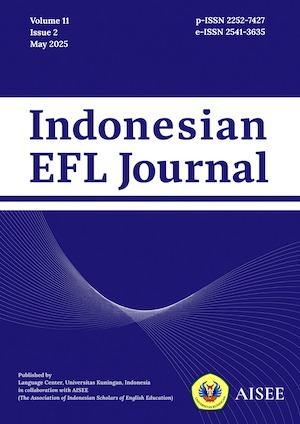THE USE OF SOCIAL MEDIA FOR LEARNING ENGLISH: STUDENTS PERSPECTIVE
Abstract
Social media has become the most influence media used by people. It changes the way people communicate and access information. Although it is not directly created for educational purposes, it has drawn educators' attention, especially in the English language learning field. Several studies have concluded that social media can be used as media in English classroom. However, to use social media effectively, it’s important to know student’s perception as reference for teacher in using social media. Thus the present study was conducted to explore high-school students’ perception of social media use for English learning. 83 students of one private Senior High School in Depok, Indonesia, were involved in this study. The study employed a qualitative approach with a case study design using questionnaires and semi-structured interview as data collection methods. Basic statistical analysis was used to analyze data from the questionnaire, and the data from interviews were analyzed using the flow model by Miles and Huberman. The results showed that the students in this study use social media for improving their English. They choose YouTube as the most used social media for learning English. Further, they stated that social media provides English content sources to practice their English skills, enlarges their vocabulary and pronunciation knowledge. They also stated the challenges in using social media for learning, such as internet connection problems, privacy, and inappropriate content.
Keywords: English learning; social media; students’ perception
References
Ahmed, B. E. S. (2020). Social media in teaching of languages. International Journal of Emerging Technologies in Learning, 15(12), 72–80.
Aloraini, N., & Cardoso, W. (2018). Social media in language learning: a mixed-methods investigation of Saudi students’ perceptions. Future-Proof CALL: Language Learning as Exploration and Encounters – Short Papers from EUROCALL 2018, 2018(2018), 1–5.
Altam, S. (2020). Influence of social media on EFL Yemeni learners in Indian university during Covid-19 pandemic. Linguistics and Culture Review, 4(1), 35–47.
Anwas, E. O. M., Sugiarti, Y., Permatasari, A. D., Warsihna, J., Anas, Z., Alhapip, L., Siswanto, H. W., & Rivalina, R. (2020). Social media usage for enhancing English language skill. International Journal of Interactive Mobile Technologies, 14(7), 41–57.
Arumugam, Wan, W. S., Shanthi, A., & Mello, D. (2019). Impact of social media on reading comprehension among undergraduates. International Journal of Advanced Science and Technology, 28(8s), 457–470.
Chen, S., Lin, L., & Yuan, X. (2017). Social media visual analytics. Computer Graphics Forum, 36(3), 563–587.
Chueinta, T. (2017). CIEC students’ behaviour In using social media to improve English language skills. Thammasat University.
Creswell, J. W. (2012). Educational Research: Planning, conducting, and evaluating Quantitative and Qualitative research (4th ed.). Pearson Education, Inc.
Dabbagh, N., & Kitsantas, A. (2012). Personal learning environments, social media, and self-regulated learning: A natural formula for connecting formal and informal learning. Internet and Higher Education, 15(1), 3–8. h
Ehsan, N., & Nasri, M. (2019). The impact of social media on EFL learners’ speaking skill. Journal of Applied Linguistics and Language Research, 6(3), 1–17.
Harding, J. (2013). Qualitative analysis from start to finish. SAGE Publications, Inc.
Inayati, N. (2015). English language teachers’ use of social media technology in Indonesian higher education context. Asian EFL Journal, 17(4), 6–36.
Jalal, A. Z. (2012). The Use of social networking in education: Challenges and opportunities. World of Computer Science and Information Technology Journal, 2(1), 2221–2741.
Kaplan, A. M., & Haenlein, M. (2010). Users of the world, unite! The challenges and opportunities of social media. Business Horizons, 53(1), 59–68.
Khan, I. U., Ayaz, M., & Faheem, M. (2016). The role of social media in development of English language vocabulary at University level. International Journal of Academic Research in Business and Social Sciences, 6(11), 590–604.
Kozhevnikova, E. (2019). The impact of language exposure and artificial linguistic environment on students` vocabulary acquisition. PEOPLE: International Journal of Social Sciences, 5(1), 4.
Lauder, A. (2008). The status and function of English in Indonesia: A review of key factors. Makara Human Behavior Studies in Asia, 12(1), 9–20.
Makodamayanti, S., Nirmala, D., & Kepirianto, C. (2020). The use of digital media as a strategy for lowering anxiety in learning English as a foreign language. Journal of Cultural, Literary, and Linguistic Studies, 4(1), 22–26.
Miles, M. B., Huberman, A. M., & Saldana, J. (2014). Qualitative data analysis: A methods sourcebook (3rd ed.). SAGE Publications, Inc.
Mohajan, H. K. (2018). Qualitative research methodology in Social Sciences and related subjects. Journal of Economic Development, Environment and People, 7(85654), 23–48.
Mohmed Al-Sabaawi, M. Y., & Dahlan, H. M. (2018). Acceptance model of social media for informal learning. Lecture Notes on Data Engineering and Communications Technologies, 5(May), 679–687.
Mubarak, A. A. Al. (2016). Learning English as a second language through social media: Saudi Arabian tertiary context. International Journal of Linguistics, 8(6), 112. https://doi.org/10.5296/ijl.v8i6.10449
Ngonidzashe, Z. (2013). Challenges and perceptions towards use of social media in higher education in Zimbabwe: a learners’ perspective. International Journal of Scientific & Engineering Research, 4(5), 242–249. http://www.ijser.org
Omar, H., Embi, M. A., & Md Yunus, M. (2012). ESL learners’ interaction in an online discussion via Facebook. Asian Social Science, 8(11), 67–74.
Sharma, V. (2019). Saudi students’ perspective on social media usage to promote EFL learning. International Journal of Linguistics, Literature and Translation (IJLLT), 2(1), 129–139.
Simon, K. (2020). DIGITAL 2020: INDONESIA. https://datareportal.com/reports/digital-2020-indonesia
Slameto. (2003). Belajar dan faktor-faktor yang mempengaruhinya. Rineka Cipta.
Yunus, M. M., Salehi, H., & Chenzi, C. (2012). Integrating social networking tools into ESL writing classroom: Strengths and weaknesses. English Language Teaching, 5(8), 42–48.
Zam Zam Al Arif, T. (2019). The use of social media for English language learning: an Exploratory study of EFL university students. Metathesis: Journal of English Language, Literature, and Teaching, 3(2), 224–233.









